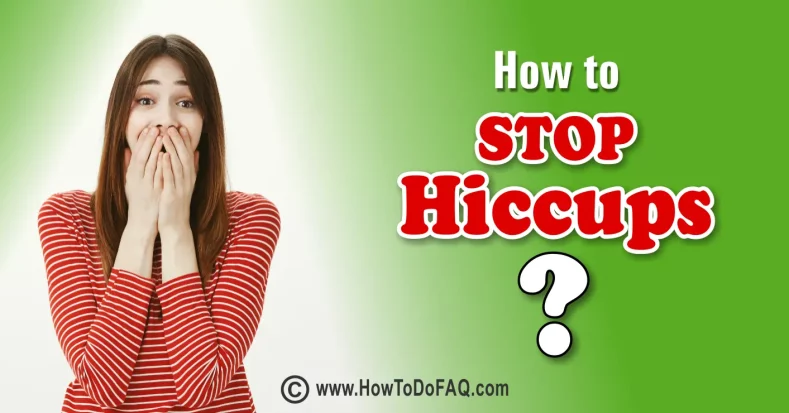A Brief But Useful Guide to Hiccup Relief: Effective Ways to Stop Hiccups
Hiccup or sob, or hiccough is scientifically called synchronized diaphragmatic flutter or singultus. Hiccups are sudden, involuntary contractions of the diaphragm muscle followed by rapid closing of the vocal cords. Though generally harmless, hiccups can be disruptive and annoying, because they sometimes last for minutes or even hours. In this article and the videos below, you can find the necessary information on “what causes hiccups” and “how to stop hiccups.”
Understanding the triggers and employing effective methods to stop hiccups can provide much-needed relief. Let’s delve deeper into the causes and explore a variety of techniques to alleviate hiccups promptly and efficiently.
Understanding the Hiccup Causes:
What causes hiccups? Hiccups can occur due to a multitude of factors, often stemming from the irritation of the nerves involved in the hiccup reflex arc. Common triggers include:
- Eating Habits: Eating too quickly, overeating, or consuming spicy or irritating foods can irritate the diaphragm and trigger hiccups.
- Carbonated Beverages: The carbonation in fizzy drinks can cause the stomach to expand, leading to irritation of the diaphragm and hiccups.
- Alcohol Consumption: Alcohol can relax the muscles involved in breathing, including the diaphragm, potentially leading to hiccups.
- Emotional Factors: Stress, excitement, or anxiety can stimulate the vagus nerve, leading to hiccups.
- Swallowing Air: Eating or drinking too quickly, chewing gum, or smoking can cause the swallowing of air, which may irritate the diaphragm and trigger hiccups.
- Temperature Changes: Sudden changes in temperature, such as consuming hot or cold foods or beverages, can sometimes lead to hiccups.
- Medical Conditions: Certain medical conditions, such as gastroesophageal reflux disease (GERD), gastrointestinal disorders, or central nervous system disorders, may also contribute to hiccups.
Now that we understand the potential triggers, let’s explore some effective methods to stop hiccups:
How to Stop Hiccups?
The methods suggested here to stop hiccups are methods that have been tried and succeeded by many people. However, which one will be effective varies from person to person. You can try and find out which method will be successful to stop hiccup in your case.
- Holding Your Breath:
Holding your breath is a classic technique for stopping hiccups. By increasing the carbon dioxide levels in the bloodstream, this method may help relax the diaphragm and halt the spasms. Follow these steps:
a. Take a deep breath and hold it for as long as comfortable.
b. Exhale slowly and repeat as needed. - Drinking Water:
Sipping cold water slowly can stimulate the vagus nerve and interrupt the hiccup reflex. Additionally, swallowing water may help regulate breathing patterns and stop hiccups. Here’s how:
a. Take small sips of cold water.
b. Swallow each sip slowly without gulping. - Applying Pressure:
Gentle pressure applied to specific areas of the body can help alleviate hiccups. One method involves pressing on the diaphragm while leaning forward. Follow these steps:
a. Stand up and lean forward slightly.
b. Use your fingers to apply gentle pressure to the diaphragm area, just below the ribcage.
c. Hold for a few seconds and release. - Breathing into a Paper Bag:
Breathing into a paper bag increases carbon dioxide levels in the bloodstream, similar to holding your breath. This method can help relax the diaphragm and relieve hiccups. Here’s how:
a. Hold a small paper bag tightly over your nose and mouth.
b. Breathe slowly and deeply into the bag for a minute or two.
c. Remove the bag and breathe normally. - Hiccup Remedies:
Several home remedies and tricks may provide relief from hiccups, including:
a. Consuming a spoonful of sugar.
b. Gargling with cold water.
c. Drinking a glass of cold water through a straw.
d. Eating a small amount of peanut butter.
e. Swallowing a teaspoon of vinegar.
Conclusion:
The frequency of How to Stop Hiccups and What Causes Hiccups questions shows that hiccups (or sob, or hiccough) can be really boring at times. That’s why we discussed the topic of how to stop hiccups and tried to briefly present information that will help you.
While hiccups are usually harmless and often resolve on their own, persistent hiccups or those accompanied by other symptoms warrant medical attention. By understanding the triggers and employing simple techniques like holding your breath, drinking water, applying pressure, and trying home remedies, you can manage to stop hiccups and regain comfort. Remember, if hiccups persist or become really bothersome, consult a healthcare professional for further evaluation and management. ■
.



